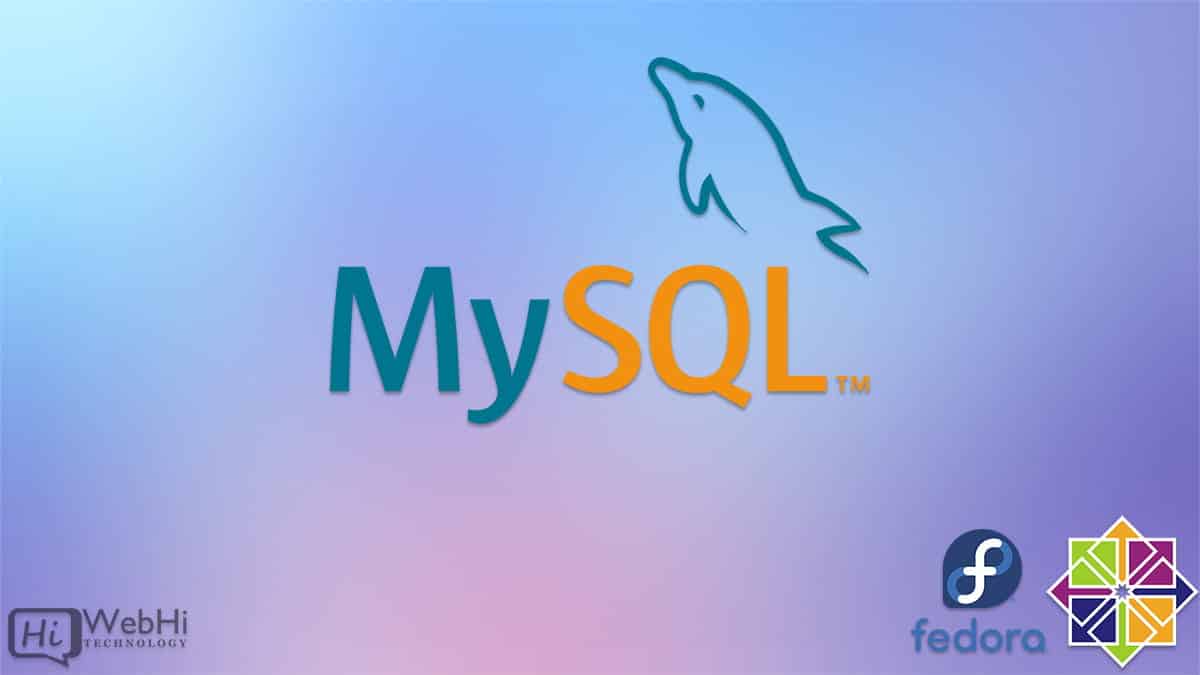تقديم

MySQL هو نظام إدارة قاعدة بيانات علائقية مفتوح المصدر (RDBMS) مع بنية العميل والخادم. RDBMS هو برنامج أو خدمة تستخدم لإنشاء وإدارة قواعد البيانات على أساس نموذج علائقي.
سيوضح لك هذا الدليل كيفية تثبيت خادم MySQL (إصدار المجتمع) باستخدام مدير الحزم الافتراضي على CentOS/RHEL 7/6، Fedora 31/30/29.
الخطوة 1: تكوين مستودع Yum يوم
### On CentOS/RHEL 7 system ###
rpm -Uvh https://repo.mysql.com/mysql80-community-release-el7-3.noarch.rpm
-------------------------------------------
### On CentOS/RHEL 6 system ###
rpm -Uvh https://repo.mysql.com/mysql80-community-release-el6-3.noarch.rpm
-------------------------------------------
### On Fedora 32 system ###
rpm -Uvh https://repo.mysql.com/mysql80-community-release-fc32-1.noarch.rpm
-------------------------------------------
### On Fedora 31 system ###
rpm -Uvh https://repo.mysql.com/mysql80-community-release-fc31-1.noarch.rpm
-------------------------------------------
### On Fedora 30 system ###
rpm -Uvh https://repo.mysql.com/mysql80-community-release-fc30-1.noarch.rpmالخطوة 2: قم بتثبيت خادم MySQL Community Server
يتضمن MySQL yum العديد من تكوينات المستودع لإصدارات MySQL المختلفة.
لذا، في ملف مستودع MySQL، قم أولاً بإلغاء تنشيط جميع المستودعات.
$ sed -i 's/enabled=1/enabled=0/' /etc/yum.repos.d/mysql-community.repoبعد ذلك، اعتمادًا على نظام التشغيل الخاص بك، استخدم إحدى التعليمات التالية لتثبيت MySQL.
CentOS & Red Hat سينت أو إس & ريد هات
$ yum --enablerepo=mysql57-community install mysql-community-serverFedora Systems فيدورا لينكس
$ dnf --enablerepo=mysql57-community install mysql-community-serverالخطوة 3: ابدأ خدمة MySQL
لبدء خادم MySQL، يمكننا استخدام services أو systemctl
Using SysVinit
$ service mysqld startUsing Systemd
$ systemctl start mysqld.serviceالخطوة 4: ابحث عن كلمة مرور MySQL للمستخدم الخارق
أثناء تثبيت MySQL 5.7، يتم إنشاء كلمة مرور مؤقتة للمستخدم الخارق MySQL. يمكن العثور على كلمة المرور المؤقتة التي تم إنشاؤها في ملفات السجل.
$ grep "A temporary password" /var/log/mysqld.logOutput :
[Note] A temporary password is generated for root@server: Hsb65pdh@t1a6
الخطوة 5: إعداد بعد تثبيت MySQL
Run the MySQL secure installation command mysql_secure_installation to secure the MySQL server after the initial installation. We recommend saying “yes” (y) to each of the questions it will ask.
$ mysql_secure_installationOutput :
Enter password for user root: The existing password for the user account root has expired. Please set a new password. New password: Re-enter new password: The 'validate_password' plugin is installed on the server. The subsequent steps will run with the existing configuration of the plugin. Using existing password for root. Estimated strength of the password: 100 Change the password for root ? y By default, a MySQL installation has an anonymous user, allowing anyone to log into MySQL without having to have a user account created for them. This is intended only for testing, and to make the installation go a bit smoother. You should remove them before moving into a production environment. Remove anonymous users? y Success. Normally, root should only be allowed to connect from 'localhost'. This ensures that someone cannot guess at the root password from the network. Disallow root login remotely? y Success. By default, MySQL comes with a database named 'test' that anyone can access. This is also intended only for testing, and should be removed before moving into a production environment. Remove test database and access to it? y — Dropping test database… Success. — Removing privileges on test database… Success. Reloading the privilege tables will ensure that all changes made so far will take effect immediately. Reload privilege tables now? y Success. All done!
الخطوة 6: إعادة تشغيل خدمة MySQL وتمكينها
بمجرد الانتهاء من تثبيت MySQL وتكوين الخيارات الأساسية، قم بإعادة تشغيل خدمة MySQL باستخدام الأمر التالي.
SysVinit
$ service mysqld restartSystemd
$ systemctl restart mysqld.serviceعلاوة على ذلك، استخدم الأمر التالي لتمكين بدء تشغيل الخدمة التلقائية عند تشغيل النظام.
### SysVinit
chkconfig mysqld on
### Systemd
systemctl enable mysqld.serviceالخطوة 7: العمل بماي إس كيو إل MySQL
الآن دعونا نتصل بخادم قاعدة بيانات MySQL، اكتب كلمة المرور الجديدة عند الطلب
دعونا نشغل بعض الاوامر SQL.
### CREATE DATABASE mysql> CREATE DATABASE DBTest; ### CREATE USER ACCOUNT mysql> CREATE USER 'dbtestuser'@'192.168.10.101' IDENTIFIED BY 'secretPass'; ### GRANT PERMISSIONS ON DATABASE mysql> GRANT ALL ON DBTest.* TO 'dbtestuser'@'192.168.1.100'; ### RELOAD PRIVILEGES mysql> FLUSH PRIVILEGES;
تهانينا! تم تثبيت خادم ماي إس كيو إل MySQL بنجاح على جهازك.
